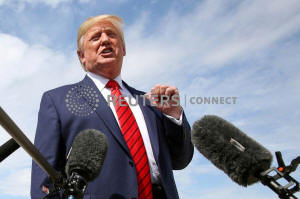U.S. House impeachment inquiry to intensify; Trump remains defiant
 Send a link to a friend
Send a link to a friend
 [September 30, 2019]
By David Morgan [September 30, 2019]
By David Morgan
WASHINGTON (Reuters) - The House of
Representatives impeachment inquiry into President Donald Trump over his
request that a foreign power investigate a domestic political rival is
set to intensify this week with testimony due from witnesses concerning
allegations made by a whistleblower within the U.S. intelligence
community.
The whistleblower's complaint cited a July 25 telephone call in which
Trump asked Ukrainian President Volodymyr Zelenskiy to investigate Joe
Biden, one of the leading Democratic candidates seeking to challenge him
in 2020, and his son Hunter, who sat on the board of a Ukrainian gas
company.
Democrats have accused Trump of pressuring a vulnerable U.S. ally to get
dirt on a political rival for personal political gain. Trump's July 25
phone call came after he froze nearly $400 million in aid intended to
help Ukraine deal with an insurgency by Russian-backed separatists in
the eastern part of the country. The aid was later provided.

The House Intelligence Committee is leading the impeachment inquiry. The
inquiry in the Democratic-led House could lead to approval of articles
of impeachment against the Republican president and a subsequent trial
in the Republican-led Senate on whether to remove Trump from office.
Intelligence Committee Chairman Adam Schiff said on Sunday he expects
the whistleblower to appear before the panel very soon.
While Congress is on a two-week recess, members of the committee will
return to the U.S. Capitol this week to carry out an investigation that
is likely to produce new subpoenas for documents and other material.
The committee is scheduled to hold a closed-door hearing on Friday with
the intelligence community's inspector general, Michael Atkinson, who
concluded that the whistleblower complaint was of urgent concern and
appeared credible.
House investigators are set to take the first witness testimony from two
people mentioned in the whistleblower's complaint.
On Wednesday, three House committees - Intelligence, Foreign Affairs and
Oversight - are due to get a deposition from former U.S. ambassador to
Ukraine Marie Yovanovitch, who Trump labeled "bad news" during his call
with Zelenskiy.
[to top of second column]
|

President Donald Trump spaeks to reporters after arriving aboard
Air Force One at Joint Base Andrews, Maryland, U.S. September 26,
2019. REUTERS/Jonathan Ernst/File Photo

On Thursday, the committees are set to get a deposition from Trump's
former special representative for Ukraine, Kurt Volker, who resigned
last week after the whistleblower complaint named him as one of two
U.S. diplomats who followed up with Ukrainian officials a day after
Trump's call to Zelenskiy.
The whistleblower has not been publicly identified. Trump, in a
series of Twitter posts on Sunday evening, said he wanted to "meet"
the whistleblower, who he called "my accuser," as well as "the
person who illegally gave this information" to the whistleblower.
"Was this person SPYING on the U.S. President? Big Consequences!"
Trump wrote.
Some House Democrats said articles of impeachment against Trump
could move to the House floor as soon as next month.
"In my mind, it's several weeks," House Judiciary Committee member
David Cicilline told reporters last week. "He has already admitted
that he contacted a foreign leader and discussed with him ginning up
a fake story about one of his political opponents."
Last Friday, the House Foreign Affairs Committee issued a subpoena
to Secretary of State Mike Pompeo for documents related to the
Ukraine scandal. House Democrats also have sought material from the
White House and Justice Department.
Schiff said any effort by Trump to stonewall the probe could be used
to impeach him for obstructing Congress.
Trump has withstood repeated scandals since taking office in 2017.
House Democrats considered, but never moved ahead with, pursuing
articles of impeachment over Trump's actions relating to Russian
interference in the 2016 U.S. election aimed at boosting his
candidacy.
The United States has been giving military aid to Ukraine since
Russia's annexation of Crimea in 2014.
(Reporting by David Morgan; Editing by Will Dunham)
[© 2019 Thomson Reuters. All rights
reserved.]
Copyright 2019 Reuters. All rights reserved. This material may not be published,
broadcast, rewritten or redistributed.
Thompson Reuters is solely responsible for this content. |